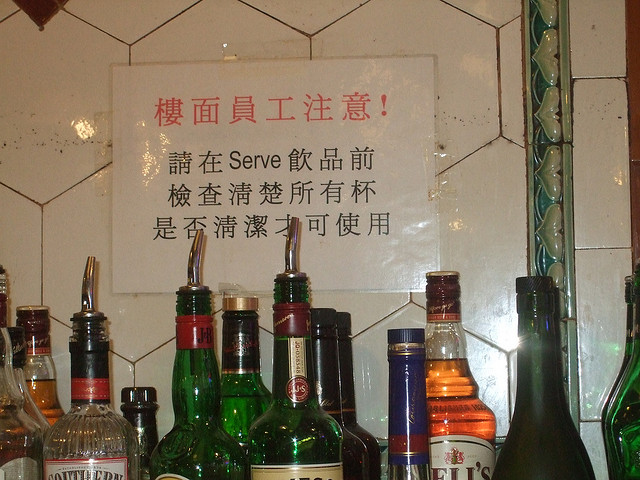Archive for Borrowing
September 17, 2015 @ 4:49 pm· Filed by Victor Mair under Borrowing, Slang
In recent years, this has been one of the most common modifiers and exclamations in Chinese. You can say just "niu" by itself, where "niu" actually means niú 牛 ("cow"), but that's an elision of "niuB" or "niubi", which in turn means "cow pussy". Although "niu(B/bi)" is used so frequently, in mixed company, on packaging, and so forth that it has lost much of its original shock value, it now means not much more than "awesome". Nonetheless, I would recommend scrupulously avoiding it in situations where you are expected to be polite and formal.
Although "niu(B/bi)" may amount to "awesome", it is far more colorful and crude. The origin of this usage is quite vulgar; for explanations, see here, here (with links to other posts in which the term is treated), also here and here.
Read the rest of this entry »
Permalink
September 2, 2015 @ 8:55 am· Filed by Victor Mair under Borrowing, Language and education, Language and politics
In "Should Africa speak Mandarin?" (ZimDaily [8/31/15]), the phrase "political gat kruiping" occurs twice. Upon first occurrence, "gat kruiping" is defined as "brown nosing". Since this is in the context of "introducing Mandarin in schools next year to pupils between the grades 4 and 12", I was curious about the nuances and form of "gat kruiping".
Read the rest of this entry »
Permalink
July 26, 2015 @ 5:35 pm· Filed by Victor Mair under Alphabets, Borrowing, False friends, Writing systems
Back in mid-December, 2013, I started assembling materials for a post about the differences between Chinese and Japanese writing. I think that someone (I forget who) sent me a couple of links that stimulated me to think about this topic, and then I added some things of my own. That was about as far as I got, though, so the would-be post was filed away in my drafts folder until I stumbled upon it today.
Read the rest of this entry »
Permalink
June 5, 2015 @ 3:06 pm· Filed by Victor Mair under Borrowing, Proverbs, Translation
Jan Söhlke was intrigued by the issue of fake Chinese proverbs that had come up in some recent Language Log posts. That reminded him of the time when he was preparing his MA Thesis he stumbled across an unusual selection of Chinese proverbs. His thesis is on Wilhelm Raabe's novel Das Odfeld. As a motto Raabe uses a quote from a text by his own grandfather, August Heinrich Raabe, that appeared in a journal called the Holzmindisches Wochenblatt (Holzminden Weekly) back in 1787. As Jan was leafing through the journal, he noticed a group of Chinese proverbs. It struck him as a bit odd, so he made a copy. Unfortunately, at the time he did not own a digital camera nor did he have a cell phone with camera, so he had to type them by hand.
Read the rest of this entry »
Permalink
June 3, 2015 @ 2:04 pm· Filed by Victor Mair under Bilingualism, Borrowing, Writing systems
Sign on a pet-grooming place in Banqiao, Taiwan (contributed by Mark Swofford):

Read the rest of this entry »
Permalink
May 31, 2015 @ 12:42 pm· Filed by Victor Mair under Borrowing, Phonetics and phonology, Pronunciation, Topolects
A couple of weeks ago, we encountered the case of Chang Chun-ning being asked by her fěnsī 粉絲 ("fans") on the Mainland to change one of the characters in her name that they weren't familiar with:
"7,530,000 mainlanders petition Taiwan actress to change her name" (5/14/15)
After the incident about the bank in China telling Chang Chun-ning to change her name that was quoted and translated by K. Chang here ("Even the bank wanted me to change my name. I've had enough!!!!!!"), there is another clause that finishes her Weibo (microblog) post, as quoted in the China Times article:
hái fù shàng 'zhuākuáng' de tiētú 還附上「抓狂」的貼圖。
Read the rest of this entry »
Permalink
May 3, 2015 @ 10:42 pm· Filed by Victor Mair under Borrowing, Language and science, Names, Writing systems
Mike Pope relayed to me the following from his son Zack, a high school physics teacher:
I was wondering what the periodic table of elements looked like in China, and found this image.
This may or may not be the "official" periodic table, but I thought it was interesting to see the similarities in the characters. Specifically the character for gold, which is also the character for metal in general, and is a prefix for a large portion of the periodic table. The character for water is a large part of the character for mercury, and a few others, and all of the gas elements have the same character in them. It makes me wonder what the protocol is for naming new elements in Chinese, since they seem to be focused on the properties of the element itself, and that would take more investigating than might be possible for new elements, which usually only exist for fractions of fractions of seconds. Newly discovered elements these days are named (in English) after people: Bohrium, Rutherfordium, Fermium, Einstenium, etc. and I wonder what the Chinese equivalent of those elements is.
Read the rest of this entry »
Permalink
April 10, 2015 @ 10:56 pm· Filed by Victor Mair under Borrowing, Language teaching and learning, Quizzes
This is a quiz. It's a short, pop quiz, but the post is going to be very long.
1. In what language is the title of this post written?
2. What does the title mean?
Read the rest of this entry »
Permalink
April 1, 2015 @ 3:35 am· Filed by Victor Mair under Borrowing, Writing systems
Ben Zimmer was recently in Pittsburgh, where he gave the keynote address at the American Copy Editors Society conference. He mentioned that one of the copy editors (Bill Walsh of the Washington Post) was confused by a sign for a new bar/lounge in Pittsburgh:
Read the rest of this entry »
Permalink
March 21, 2015 @ 1:18 pm· Filed by Victor Mair under Borrowing, Jargon
When I was a student at Dartmouth (1961-1965), from around mid-December to mid-March, we had roughly three feet of snow on the ground much of the time, but then came the big melt, and we called it the "schlump" season. The paths across campus were so muddy that the buildings and grounds crew placed "duck boards" on the ground for us to walk on.
Read the rest of this entry »
Permalink
March 17, 2015 @ 7:29 am· Filed by Ben Zimmer under Borrowing, Language and advertising, Phonetics and phonology
On Facebook, Bert Vaux posted about a fascinating bit of Danish loanword phonology.
While watching the Danish show Borgen last night I noticed that Kasper, when talking about ordering a smoothie, first said [smu:di] and then later said [smu:ði]. The first form in particular but also the variation pleased me, so I asked Anna Jespersen about it and look at this bonanza she came up with! (What follows is a paraphrase of what she sent me.)
Smoothie is a newly borrowed word, and I think it's the only one we have encountered with a non-initial [ð]. Consequently, there's a lot of variation. [ð] and [d] would be the most common variants but there are lots of other options. Check out these two ads from McDonald's:
i. In the attached print ad, the line below the smoothies reads "Try our new, refreshing smoothies (no matter how you pronounce them)".

Read the rest of this entry »
Permalink
March 10, 2015 @ 7:35 am· Filed by Victor Mair under Borrowing, Language and culture, Language and society, Lexicalization, Words words words
Bob Bauer writes:
Yesterday I discovered that the concept 'person who is continuously looking at or obsessively interacting with his/her smartphone or other type of electronic handheld device' has been lexicalized in Cantonese as 低頭族 dai1 tau4 zuk6 (literally, 'head-down tribe') (according to an article by Mark Sharp in the South China Morning Post).
[VHM: See "Beware the smartphone zombies blindly wandering around Hong Kong" (3/2/15)]
Have you heard of this word? It may have originated in Taiwan Mandarin.
"低頭族" 853,000 Ghits (on March 4, 2015)
Read the rest of this entry »
Permalink
March 1, 2015 @ 8:52 pm· Filed by Victor Mair under Borrowing, Topolects
Michael Rank sent in this photograph taken at the Shanghai restaurant in Dalston, London E8:

Read the rest of this entry »
Permalink


